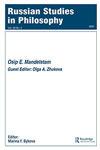后人文主义时代
IF 0.1
4区 哲学
Q4 Arts and Humanities
引用次数: 0
摘要
摘要近年来讨论的许多理论都不信任人类学的进展,或者公开敌视人类学的进展。环境问题、全球政治以及生物学和医学的发现为这种态度奠定了丰富的基础。它们也表现在评论的类型上,这些评论来自严格的理论和科学领域,进入无法证实的预测、预测和程序区域。也许只有媒体哲学仍然敢于谈论媒体人类学的必要性。然而,在这样的条件下,在有机物和无机物的不可分辨性中,如何才能试图确定什么是人类?人们还能用什么语言来讨论它——精神分析的丧失、科学的公正、文学小说的语言?一个人可以通过什么概念来规划路径——功能的路径、环境的路径、系统的路径?这篇文章简要概述了本期特刊所载的文章。这些文章的作者试图通过从宇宙和普遍的角度以自己的方式释放这一概念来谈论人类。本文章由计算机程序翻译,如有差异,请以英文原文为准。
The Era of Posthumanism
ABSTRACT Many of the theories that have been discussed in recent years are distrustful of the anthropological inroads or are openly hostile to them. The problems of the environment, global politics, and the discoveries of biology and medicine create a rich foundation for such attitudes. They are also manifested in the genres of comments that emanate from the domains of rigorous theory and science into the zones of unprovable projections, forecasts, and programs. Perhaps only media philosophy still dares to talk about the need for media anthropology. Yet how is it possible to try to determine what is human in such conditions—among conglomerations of particles (Whitehead-Latour) and entanglements (Barad), in the indiscernibility of the organic and the inorganic? What language can one still use to discuss it—the language of psychoanalytic loss, of scientific impartiality, of literary fiction? Through what concepts can one lay out the path—of function, of environment, of system? This article provides a brief summary of the selection of articles included in the present special issue. The authors of these articles attempt to talk about the human by unleashing this concept in their own way from a cosmic and universal perspective.
求助全文
通过发布文献求助,成功后即可免费获取论文全文。
去求助
来源期刊

RUSSIAN STUDIES IN PHILOSOPHY
PHILOSOPHY-
CiteScore
0.10
自引率
0.00%
发文量
14
期刊介绍:
Russian Studies in Philosophy publishes thematic issues featuring selected scholarly papers from conferences and joint research projects as well as from the leading Russian-language journals in philosophy. Thematic coverage ranges over significant theoretical topics as well as topics in the history of philosophy, both European and Russian, including issues focused on institutions, schools, and figures such as Bakhtin, Fedorov, Leontev, Losev, Rozanov, Solovev, and Zinovev.
 求助内容:
求助内容: 应助结果提醒方式:
应助结果提醒方式:


